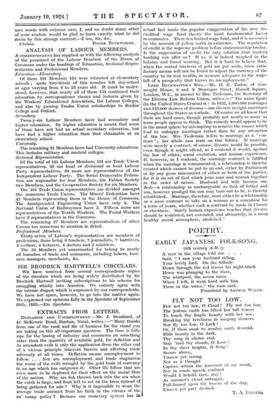EXTRACTS FROM LETTERS.
DEFLATION AND UNEMPLOYMENT.—Mr. J. Beanland, of 41 McKenzie Road, Durban, Natal, writes :—" Many thanks from one of the rank and file of business for the stand you are taking on this all-important question. The time is fully ripe for the basing of industry and commerce on something other than the quantity of available gold, for deflation and Its attendant evils is only the application from the other end of a vicious principle inherent therein and affecting trade adversely at all times. Deflation means unemployment to follow. . . . Nor are unemployment and trade stagnation the worst of the evils wrought by the gold basis of currency in an age which has outgrown it. Other ills follow that are even more to be deplored for their effect on the moral fibre of the nation. Why are fish thrown back into the sea when the catch is large, and fruit left to rot on the trees instead of being gathered for sale ? Why is it impossible to wean the average trade unionist from his faith in the virtues of the ea' canny policy ? Because our monetary system has in
actual fact made the popular exaggeration of the now dis- credited wage fund theory the most fundamental factor
in economics. There is a limited wage fund, and it is measured by the amount of yellow earth in existence. The regulation of credit is the supreme problem before statesmanship to-day. Is the suppression of credit the only solution that modern banking can offer us ? If so, it is indeed weighed in the balance and found wanting. But it is hard to believe that, when the vested interests of gold are put aside, some satis- factory means will not be found to adjust the currency of the country to its real wealth, in measure adequate to the wage- bill of a prosperity that knows no unemployment."
LORD BUCEMASTER'S BILL.—Mr. H. E. Tudor, of Con- naught House, 8 and 9 Montague Street, Russell Square, London, W.C., in answer to Mrs. Tiedeman, the Secretary of the Divorce Law Reform Union, writes :—" The main figure (in the United States Census) is : in 1922, 1,000,000 marriages and 125,000 decrees of divorce—one divorce in eight marriages throughout the States as a whole. Of course we all know that there are hard cases, though probably not nearly so many as some people appear to think. The remedy would appear to lie in the moral sphere by attempting to remove the causes which lead to unhappy marriages rather than by any alteration of the law. Mrs. Tiedeman refers to marriage as a ' con- tract ' ; her whole case rests on this fallacy. If marriage were merely a contract, of course, divorce would be possible, even though it might offend, as I contend it would, against the law of ethics, social evolution, and human experience. If, however, as I contend, the marriage contract is fulfilled when the marriage is consummated, a relationship is thereby created which cannot be put to an end, either by Parliament or by any gross misconduct of either or both of the parties, for it is an act of God which joins man and woman together in the order of nature. Husband and wife become one flesh—a relationship as unchangeable as that of father and son, however prodigal the son may turn out to be, is thereby established. Marriage, therefore, must either be a relationship or a mere contract to take on a woman as a concubine for a term of years, whether such a contract be made in Church or elsewhere. Surely human experience teaches that divorce should be restricted, not extended, and ultimately, in a more healthy moral atmosphere, abolished."










































 Previous page
Previous page